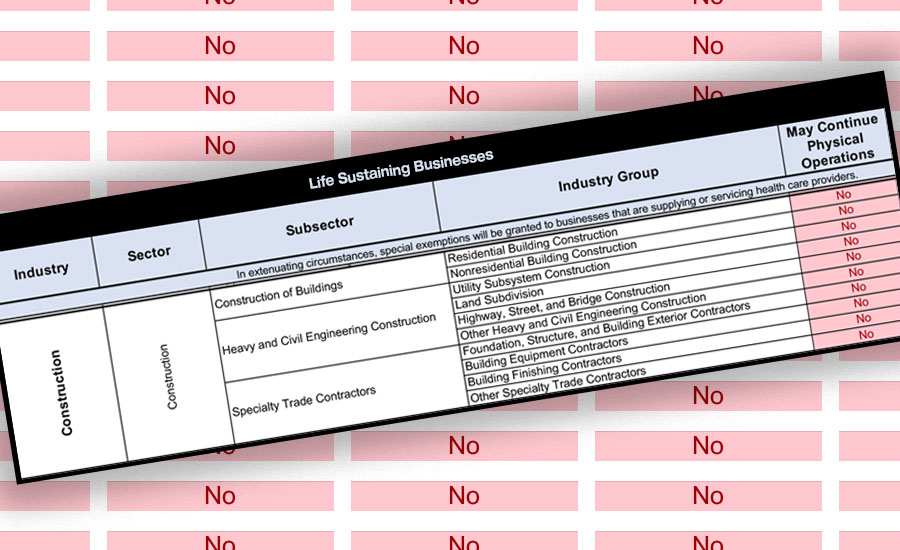The state of Pennsylvania took the unprecedented step of ceasing operations of all “non-life sustaining businesses” in an effort to stop the spread of COVID-19, putting an immediate halt to work at thousands of construction sites. Gov. Tom Wolf (D-Pa.) made the announcement March 19, just hours before an 8 p.m. deadline to close those businesses. [Businesses react]
“We have no time to lose. With every minute that passes, more Pennsylvanians come in contact with the COVID-19 virus,” he said. As of Thursday evening, the state had 185 cases of COVID-19 and one death.
Pennsylvania Firms Rush to Comply With State Project Shutdown Order
ENR’s latest coverage of the impacts of the COVID-19 pandemic
California soon followed suit with an order for its nearly 40 million residents to stay at home, except for workers in 16 critical infrastructure sectors. It was unclear at press time whether California's order applied to construction in those sectors.
New York announced March 19 that, effective on March 20, it expands to 75% from 50% the proportion of employees in non-essential business sectors that must work offsite. The edict from Gov. Andrew Cuomo continues to exempt construction firms and "essential infrastructure operations" such as utilities, airports, trarnsportation and telecommunications, although New York City Mayor Bill de Blasio may be considering a city jobsite shutdown, several media report.
Scrambling
In Pennsylvania, operations will cease within all sectors of construction, from heavy/civil projects including highways and bridges, to building construction, including institutional and residential, as will all specialty trade work. A chart released by the governor’s office stated that “in extenuating circumstances, special exemptions will be granted to businesses that are supplying or servicing health care providers,” but at press time, project teams and trade organizations were scrambling to ascertain how to apply for exemptions and what the criteria will be.
David Daquelente, executive director of the Master Builders’ Association of Western Pennsylvania, says “tonight I’ve had several conversations about efforts underway on whatever the processes or procedures are to get life sustaining projects approved, especially if they relate to health care.”
Officials at Philadelphia Airport are going through their interpretation of the order and will decide in the next 24 hours what to do, says spokesperson Florence Brown.
The General Building Contractors Association in Philadelphia, in a statement, said it is “actively seeking a grace period for construction projects to ensure that stability and security can be maintained during a temporary shutdown” and asking “whether work for life-sustaining businesses such as hospitals/medical facilities will be permitted to remain operational."
The order follows action by PennDOT earlier this week that put approximately 850 transportation-related construction projects on hold “to quickly minimize exposure for both PennDOT and private-sector employees,” according to spokeswoman Erin Waters-Trasatt. “We are actively working closely with our industry partners to find innovative, collaborative and safe solutions for how these activities can eventually resume with safety at the forefront.”
Enforcement on March 21
Enforcement for Wolf's stoppage order will begin on March 21, giving firms just one business day to secure and stabilize their construction sites. “I will work with local officials, permitting authorities and others to enforce mandatory closures,” Wolf warned.
Daquelente says he expects some exemptions will be required and it may take more than a day to ensure sites are safely secured and that any in-progress site work will be shored up and stabilized for however long the shutdown lasts.
While hopeful a quick resolution will be found for the coronavirus, Daquelente says if the shutdown goes on indefinitely, “our concerns for the industry are grave” resulting in “long term and lasting impacts to the economy and to construction industry in particular.”
Wolf said he sympathizes with people who are worried about the financial repercussions of the closure. “I’m aware of it, and my administration is already working every channel to support businesses and workers. But before we save livelihoods, we must save lives,” he said.
Work at many companies will continue virtually as they polish up their teleworking capabilities. “If the shutdown lasts for a couple of weeks, I think we’ll recover quickly,” says Sean Fernandez, a project engineer at civil engineering firm Shelly, Witter & Fox in Greencastle. “But if it’s any longer than that, I’m concerned about developers’ confidence in investing in the next several months.”
Construction Plant Sites Open
The order appears to shutter many construction-related manufacturing plants, such as gypsum, glass and industrial machinery, but not cement and concrete production plants or construction machinery manufacturing facilities.
Existing petroleum and chemical plants are also exempted from the shutdown, but it wasn’t clear whether construction of those facilities is included in the “life sustaining business” category.
Regardless, Shell Pennsylvania Chemicals had decided prior to the governor’s order to send approximately 8,000 workers home at it's $6-billion petrochemicals complex in Beaver County. "In the days ahead, we will install additional mitigation measures aligned with CDC guidance. Once complete, we will consider a phased ramp-up that allows for the continuation of safe, responsible construction activities,” says Hilary Mercer, vice president of Shell Pennsylvania Chemicals.
“We stand ready to assist our local chapters and they work to mitigate the potential impact of this order, says Brian Turmail, spokesman for the Associated General Contractors of America, which has lobbied for increased precautions at construction sites to avoid blanket shutdowns. “Our worry remains that these kind of arbitrary halts to construction activity will do more harm than good.”






